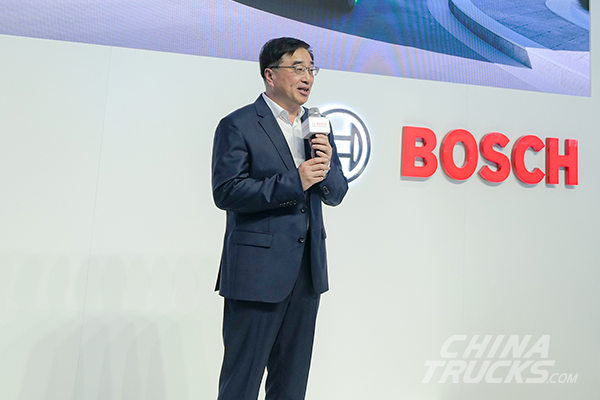Shanghai, China – A new era of mobility is taking shape. At the 2023 Shanghai International Automobile Industry Exhibition(Auto Shanghai 2023), Bosch is showcasing its integrated and cutting-edge solutions for automation, electrification, personalization, and connectivity. The booth features locally developed technologies and innovations designed to meet the specific demands of the Chinese market, such as 190kW fuel cell power module, Information Domain Computer 4.0,Vehicle Dynamics Control 2.0, oil-cooled co-axle electric motor with the latest power electronic control unit.
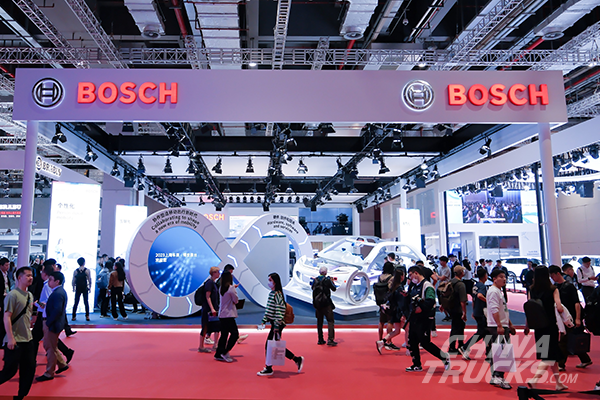
As a global supplier of mobility solutions, Bosch is working at full speed to seize the opportunities inautomotive industry, especially in the trends of software-defined vehicles and electrification. “The thriving Chinese automotive industry is not only at the forefront of new energy andsmart mobility trends globally, but also a leading market for Bosch, where we apply our latest innovations to the vehicles on the roads,”said Dr. Markus Heyn, member of the Bosch board of management and chairman of the Mobility Solutions business sector, at 2023 Auto Shanghai.
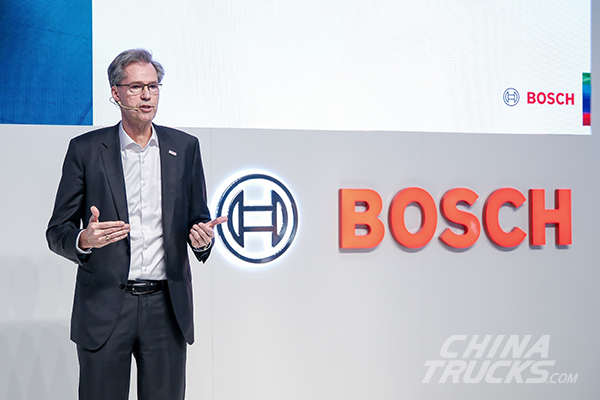
In 2022, Bosch China mobility business sector achieved year-on-year growth of around 7 percent, to approximately 103.6 billion CNY (around 14.6 billion euros).“One major driving force of growth is our business with Chinese automakers. With our strong local presence in both R&D and manufacturing, and leveraging our global networking strengths, we are fully committed to supporting the local market and striving for leadership in key areas such as software and electrification,” said Dr. Xu Daquan, Executive Vice President of Bosch China.
Offering software solutions atall levels
As vehicles evolve, they are resembling more and more like smartphones on wheels – consisting of hardware, operating systems, software, services, and other components. However, unlike smartphones, vehicles are much more complex, particularly when it comes to safety-critical functions. As a leading expert in both software and automotive engineering, Bosch is ideally positioned to offer software solutions across all levels to enable our customers to efficiently develop intelligent and appealing vehicles.
Bosch is showcasing a wide range of innovations at Auto Shanghai 2023, highlighting the growing importance of software in the implementation of personalization, automation, connectivity, and electrification features. The major exhibit SPACE car being presented for the first time in China, showcases Bosch's Electrical/Electronic (E/E) architecture and demonstrates how the company's technologies work collaboratively across hardware, software, and services to deliver a comprehensive solution.
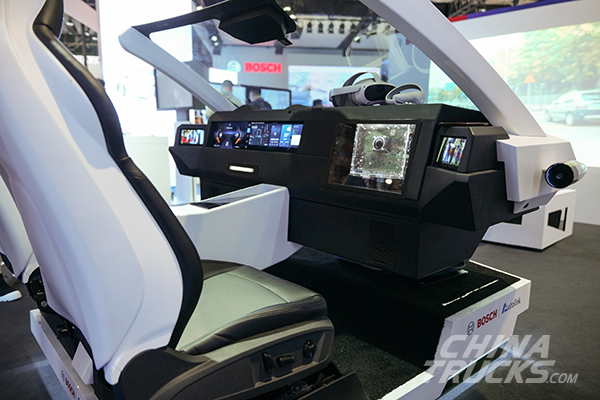
In a boost to local market demands, Bosch China is also continuously developingnew functions and products in the field of software. For example,one of the debuted local innovations is Information Domain Computer 4.0, a platform for infotainment domainwithhigh-performance SoC enabling a seamless smart cockpit experience and supporting the integration of cross-domain solution such as ADAS parking function. Another example isVehicle Dynamics Control (VDC) 2.0,incorporating an innovative smart control concept that allows the function to ‘think ahead’. Based on information from vehicle dynamics sensors, it anticipates vehicle behavior and intervenes proactively, acting instead of reacting. In response to specific demands from Chinese customers for a better driving experience, the local team continuously develops new functions, such as ‘distributed traction control system’ based on VDC 2.0. It allows the drive torque control algorithm to be encapsulated in the motor controller for more precise torque control and further reduction of wheel slip when driving off.
In terms of software development, Boschsubsidiary ETAS is showcasinga highly integrated end-to-end software-defined vehicle platform and tooling ecosystem that enables fast, data-driven development as well as safe and secure operation of automotive software. Bosch offers solutions, development tools, and services both in the vehicle and in the cloud.
In 2022, Bosch employed approximately 35,000 associates in its China Mobility Solutions sector, with over 9,000 dedicated to R&D. To accelerate the development of software-defined vehicles and respond more swiftly to growing customer demands in China, Bosch is enhancing its local R&D and software capabilities across various business fields. As part of its ongoing commitment, Bosch Cross Domain Computing Solution will inaugurate a new software center in Guangzhou later this year and is set to recruit about 100 software talents. Moreover, Bosch Huayu Steering System R&D Center in Wuhan is also planning to hire over 600 software-related professionals for coming years. And Bosch China's software center will open its third office in Wuxi in 2023.
Electrifying powertrains with diversified solutions
Electrification is another driver of fundamental change in the global automotive market, this being especially apparent in China. In 2022, the country had been the world leader in the production and sales of new energy vehicles for eight consecutive years.“At Bosch, we’re committed to facilitating the green and low-carbon development of the Chinese automotive industry, and this includes supporting the shift to new powertrains across all vehicle segments,” said Dr. Markus Heyn.
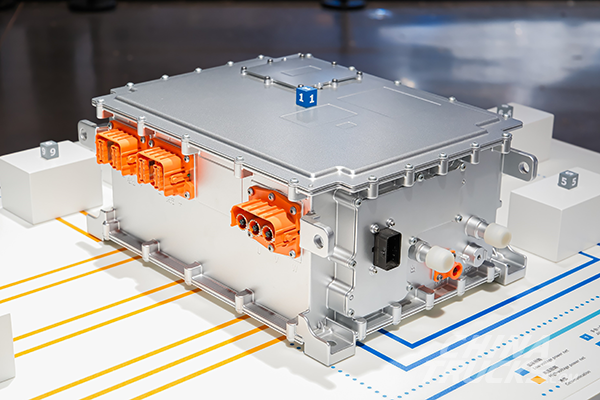
Bosch's efforts have yielded significant results in the passenger vehicle segment, where the company has supplied a large number of e-machines, inverters, and e-Axles to local customers.To cater to the growing light commercial vehicle market in China, Bosch is presenting an electric drive system that includes an oil-cooled co-axle electric motor with the latest power electronic control unit. The system has already been deployed in JiangLing's commercial vehicles and featureshigh torque, high efficiency, and lightweight design. Mass production is expected to commence in June2023.
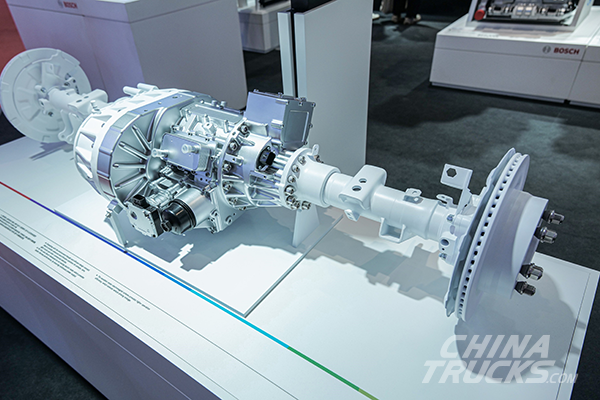
To meet more application scenarios for hydrogen, Bosch is also expanding its portfolio of fuel cell powermodules, which currently covers75kW and134kW. Now, with the debut of the locallydeveloped 190kW fuel cell power module, the needs of 49-ton heavy-duty truck can be fulfilled with a high-power single system. Besides that, Bosch is also accelerating innovation for alternative fuels like natural gas,methanol and hydrogen engine for internal combustion engines that offer new possibilities for powertrain solutions.
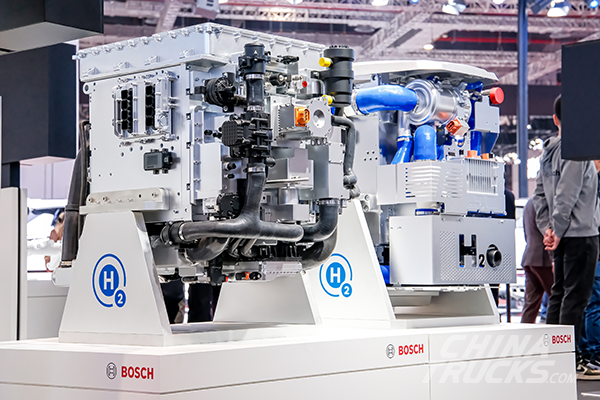
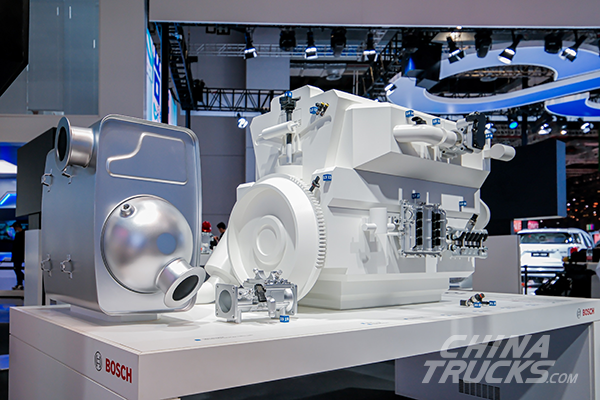
Bosch is confident in the long-term potential of the Chinese market,pledgingcontinuous investment, especially in key technology fields such as electrification. Recently, Bosch broke ground on a new manufacturing site for new energy vehicle core components and automated driving in Suzhou, representing a total investment of around 7 billion CNY (approximately 950 million euros). Additionally, Bosch has partnered with the government of Wuxi to accelerate the localization and commercialization of hydrogen fuel cells and commercial vehicle electrification.For hydrogen fuel cell technology, Bosch will officially open the joint venture with Qingling in Chongqing later this year, significantly facilitating the development and commercialization of hydrogen fuel cell systems in China.
Source : www.chinatrucks.com
Editor : Mia
Views : 20840
Tags :
Bosch
Shanghai auto show


